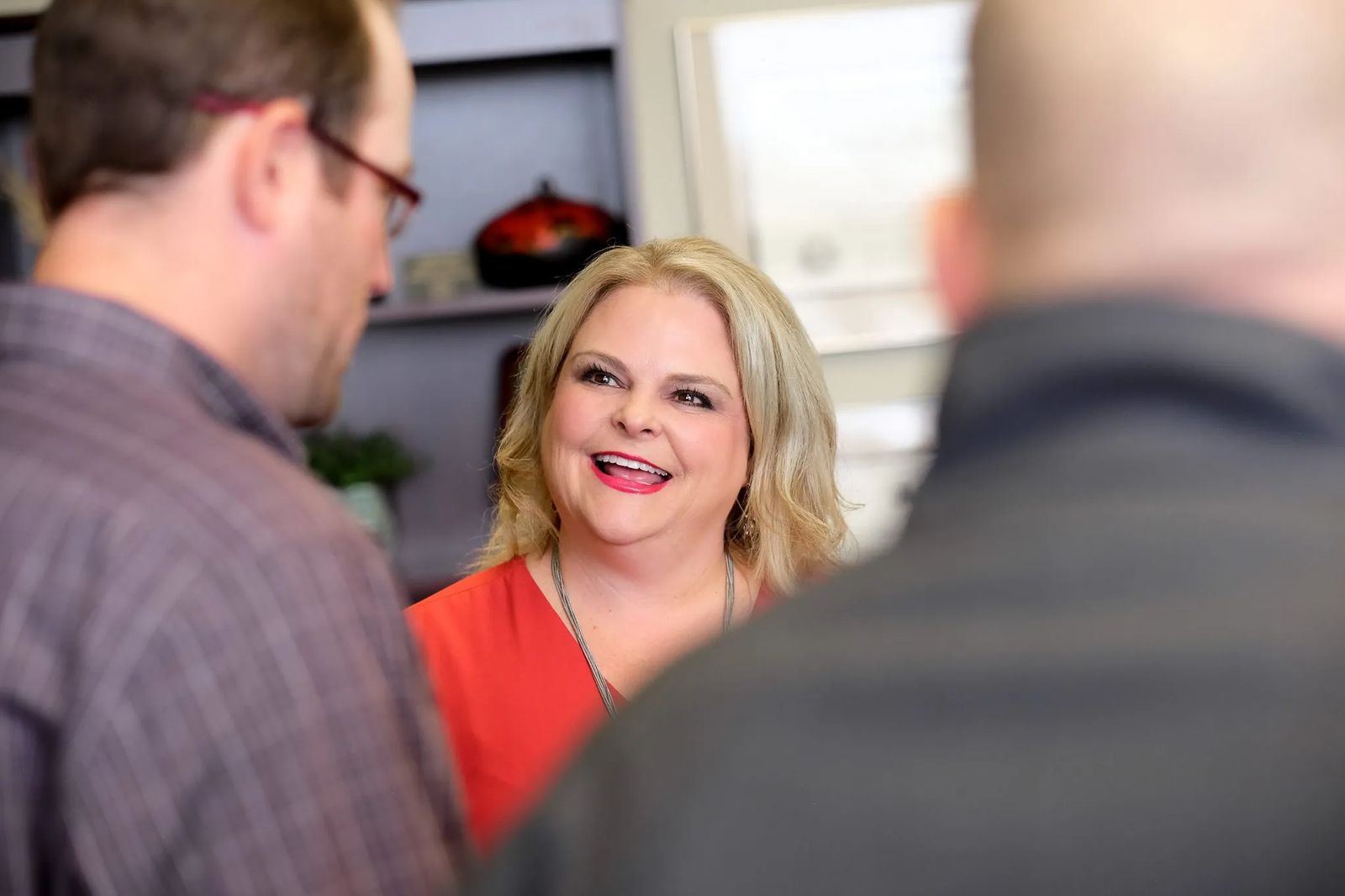
Cover Story: Restoring Honor with Justice
Judge Mary Jane Knisely’s Innovative Approach
In a quiet hallway behind the district county courtroom where Judge Mary Jane Knisely presides, a shackled and clean-shaven young man awaits transport back to the Yellowstone County Detention Facility. He shifts his weight from side to side yet stands a little taller when he sees her coming down the hall. As she passes, she looks him square in the eye and says, “If I go to bat for you, I don’t want you to let me down.” It’s clear he has a military background when he looks at her and says, “No ma’am, I won’t.”
This one-time soldier is facing charges in three states for a string of felony drug and theft charges. “I feel like the system has let him down,” Judge Knisely says. “He’s homeless now. He’s on the street. He has no money. He’s a young man that had never been arrested before his military service and now he’s a multi-state offender.” He’s a 26-year-old man facing the demons tied to his one-time heroin addiction. “That’s what happens when you send people off to places with opium fields,” she says. If he’s moved through the traditional court system, a lengthy prison term awaits him.
Judge Mary Jane Knisely wants to try a different approach.
“I just believe there is a better way of doing justice,” she says with passion in her voice. “When you send someone off to war and bring them back broken, then it’s your job to give them a chance to get them back where they were, to honor their service and help them to become whole.”
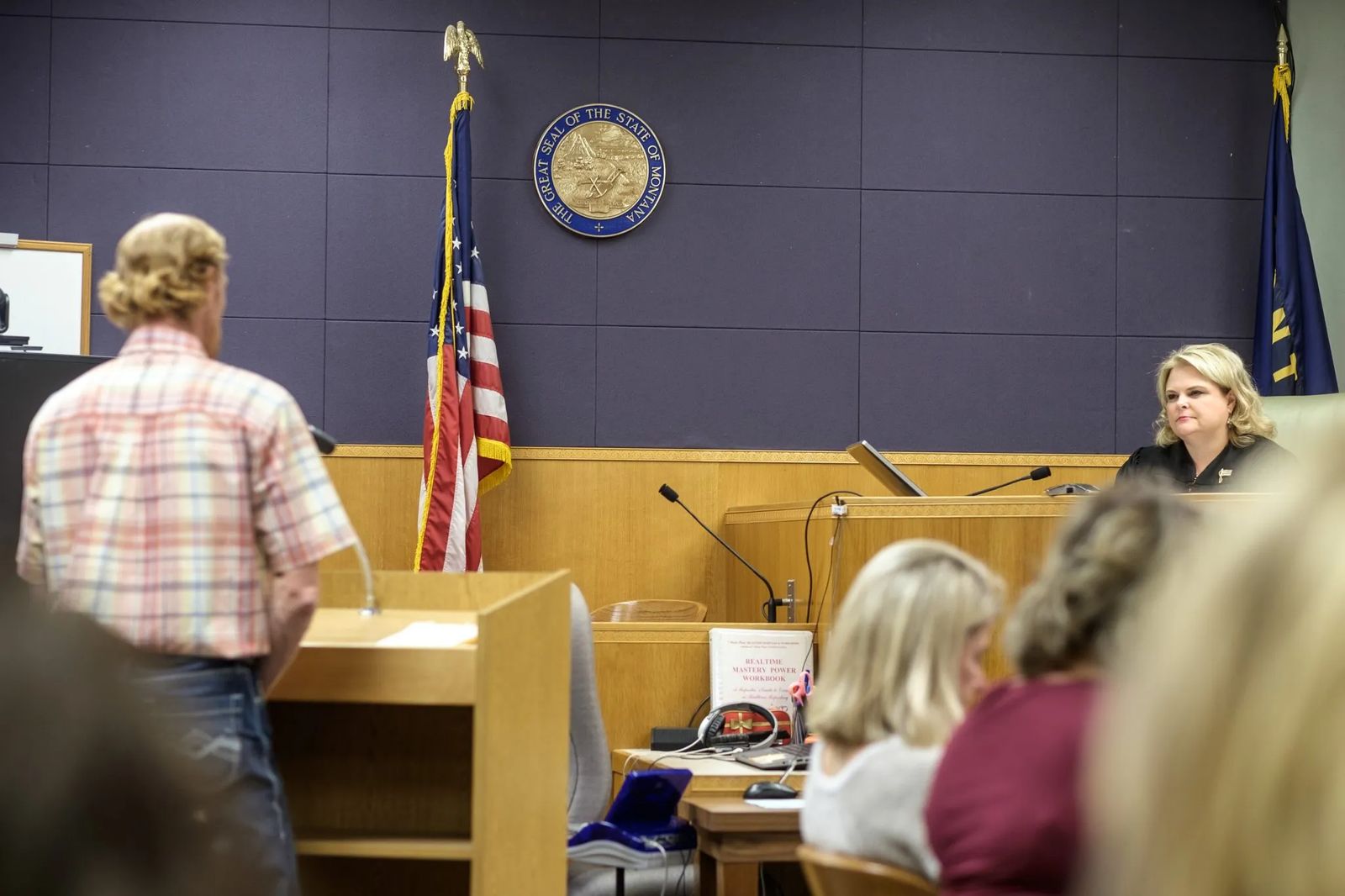
Mary Jane Knisely’s entire career has been one of public service. She started fresh out of law school as a law clerk for Judge Russell Fillner. The next eight years were spent prosecuting cases for the City Attorney’s Office. In 1997, she ran successfully for municipal judge in Billings and for the last 12 years, she’s been a pioneer in innovative criminal justice.
As a municipal court judge, Judge Knisely set up a handful of treatment courts to handle misdemeanor drug cases, DUI cases, and cases where mental health issues were at the core of the criminal charges. In 2010, after her election to the District Court bench, she petitioned the State Supreme Court to start a Felony DUI treatment court — the first of its kind in the state. Within the year, the STEER court, also known as Sobriety Treatment Excellence Education and Rehabilitation, was born. In 2011, she secured grant funding to launch another first-of-its-kind court — a veteran’s treatment court known as CAMO or Courts Assisting Military Offenders. Today, Judge Knisely sits at the helm of these two therapeutic justice programs that deliver intense supervision and accountability.
“I feel the way we’ve done justice, the way we’ve handed out cookie cutter sentences all these years, has been the recipe for disaster,” Judge Knisely says. “No one considered why they ended up in court to begin with, and the cycle of families just continued to come through the system based on poverty, addictions, abuse or trauma. The only way to break that is to come and be excited every day and try to come up with a creative solution, being dedicated to resolving it, and having an end that fits that individual.”
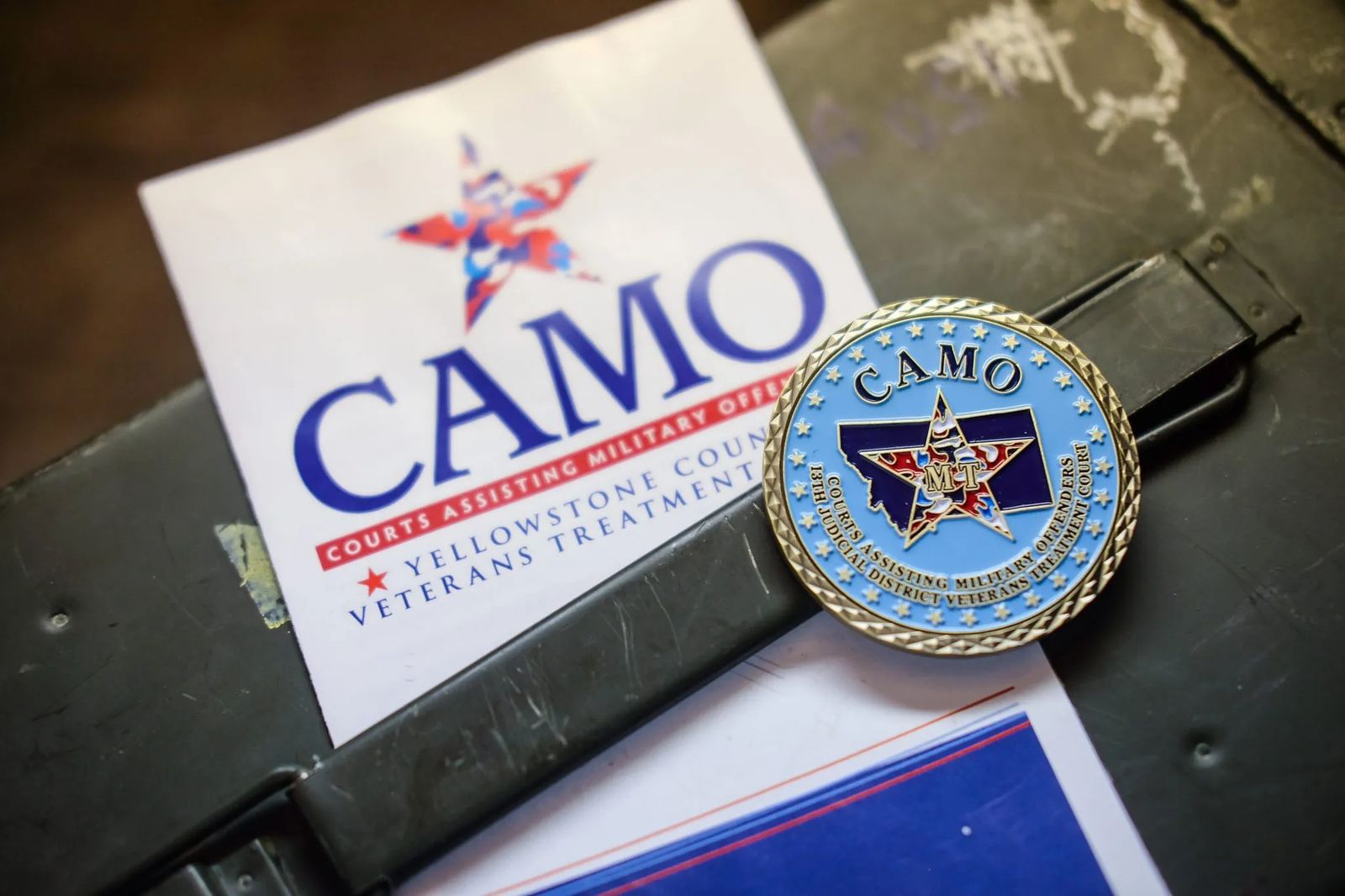
THE SUCCESS IS IN THE STATISTICS
Right now, 1,700 inmates sit in the custody of the Montana Department of Corrections. Last year, 329 of those inmates were granted parole. If historical data holds true, 54% of male offenders and 53% of female offenders will be back behind bars before they even reach the year anniversary of their release.
Let those numbers sink in a bit as we take a glance at the success witnessed in Judge Knisely’s treatment courts.
Since the STEER court launched, 242 offenders joined the program and 82% graduated. A little more than 12% reoffended. Of the 101 vets to appear before the CAMO court, 73% have graduated and, to date, only one person faced the criminal justice system again. It’s easy to see why there’s a waiting list for offenders to enter both court programs.
“The research in problem-solving courts shows that if a judge spends three minutes a week with these participants, that the outcomes are so different — just by spending that time talking to those people,” she says. Judge Knisely speaks with passion when she shares one transformation story. “I had one client who was burrowing holes down by the Yellowstone River because he was under the influence of meth. He was arrested for driving a skid steer because he thought the feds were chasing him. He’s become someone who has 600 days clean and sober. He has his own business and is now mentoring other addicts. That’s a big deal.” It’s one less repeat offender willing to take to the road under the influence. “This is the single greatest thing I have ever been involved in during my career,” Judge Knisely says of her treatment courts. “It’s pretty moving.”
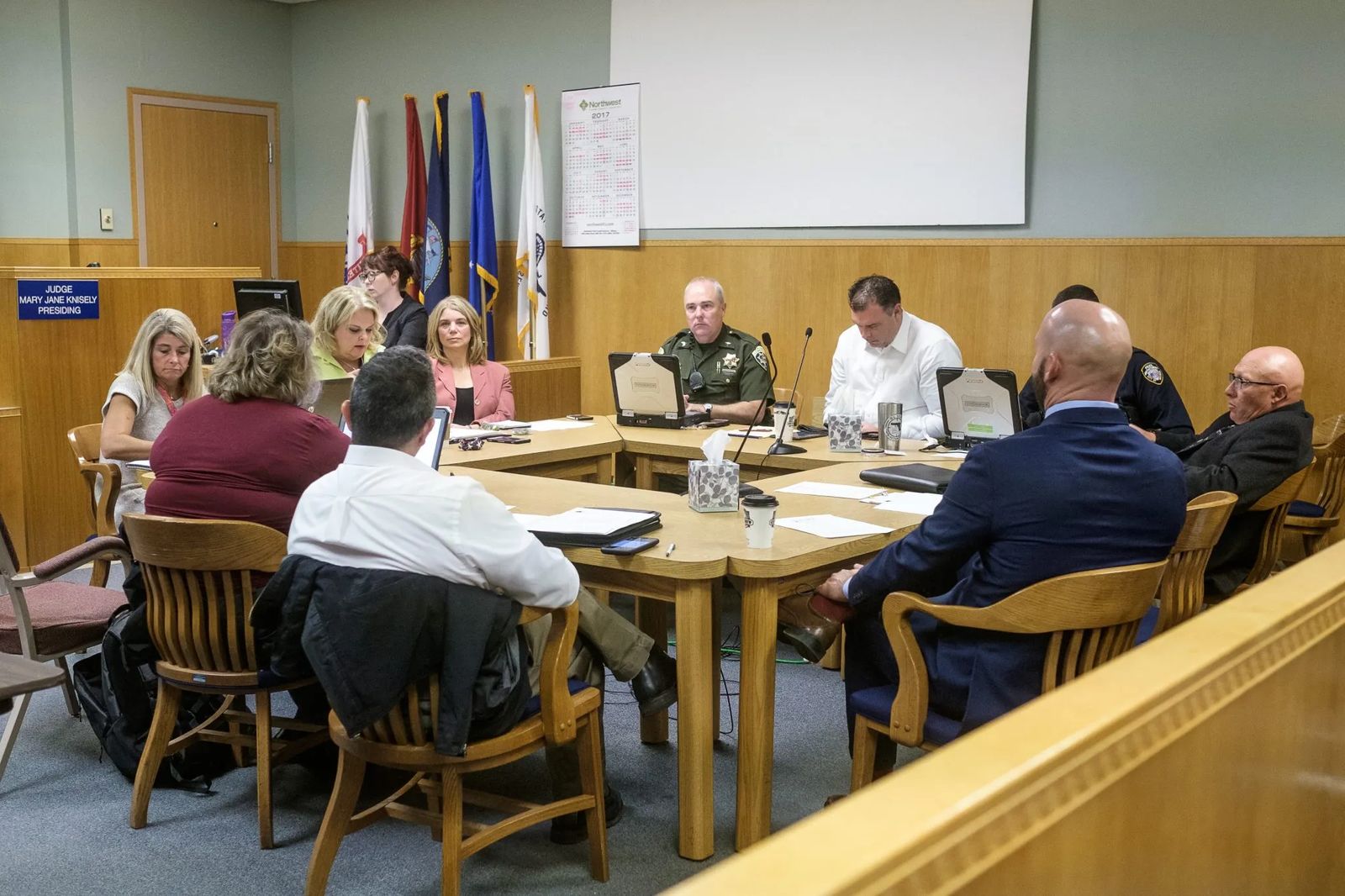
SERVING AS A MENTOR
Early on a Wednesday morning, Judge Knisely’s courtroom looks more like a social hour than an official court proceeding. Coffee and bagels sit on the table and seats are set up in a square for all to actively talk and listen to one another. File folders line the table and are shuffled between law enforcement, probation officers, treatment professionals, a defense attorney, representatives from the Veteran’s Administration, a Yoga instructor, a court administrator and Judge Knisely herself. This is case review time when every voice at the table talks openly about a client’s progress before that client appears before the court that day.
“I will say that you can never guess who will do well in this program,” Judge Knisely says. “The research shows that the worst of the worst do the best. That’s who these programs are designed for — the highest risk and the highest need.”
In May, both the CAMO and STEER courts were designated as being mentor courts — one of only a handful across the nation. “It was a double blessing,” says the judge. For the next three years, those representing jurisdictions from all over the country will come and watch Judge Knisely and her team at work. They’ll soak up the scene and tap them for knowledge on how to set up courts in their home states. Already this courtroom has played host to teams from New Mexico, Nebraska, California, and Arizona, just to name a few. In December, they’ll take in a team from Guam.
It probably comes as no surprise that veterans are literally begging to be a part of this program. “We get referrals from all over the state,” Judge Knisely admits. And because of it, she successfully landed a grant for a teleservice project so veterans from rural communities can still access the court. Thanks to the Center for Court Innovation, Judge Knisely’s court is one of only four in the nation test-driving technology to bridge the distance for clients facing this kind of justice.
 Representatives from Douglas County, Nebraska watch the proceedings of Judge Knisely's CAMO Court. [/caption]
Representatives from Douglas County, Nebraska watch the proceedings of Judge Knisely's CAMO Court. [/caption]
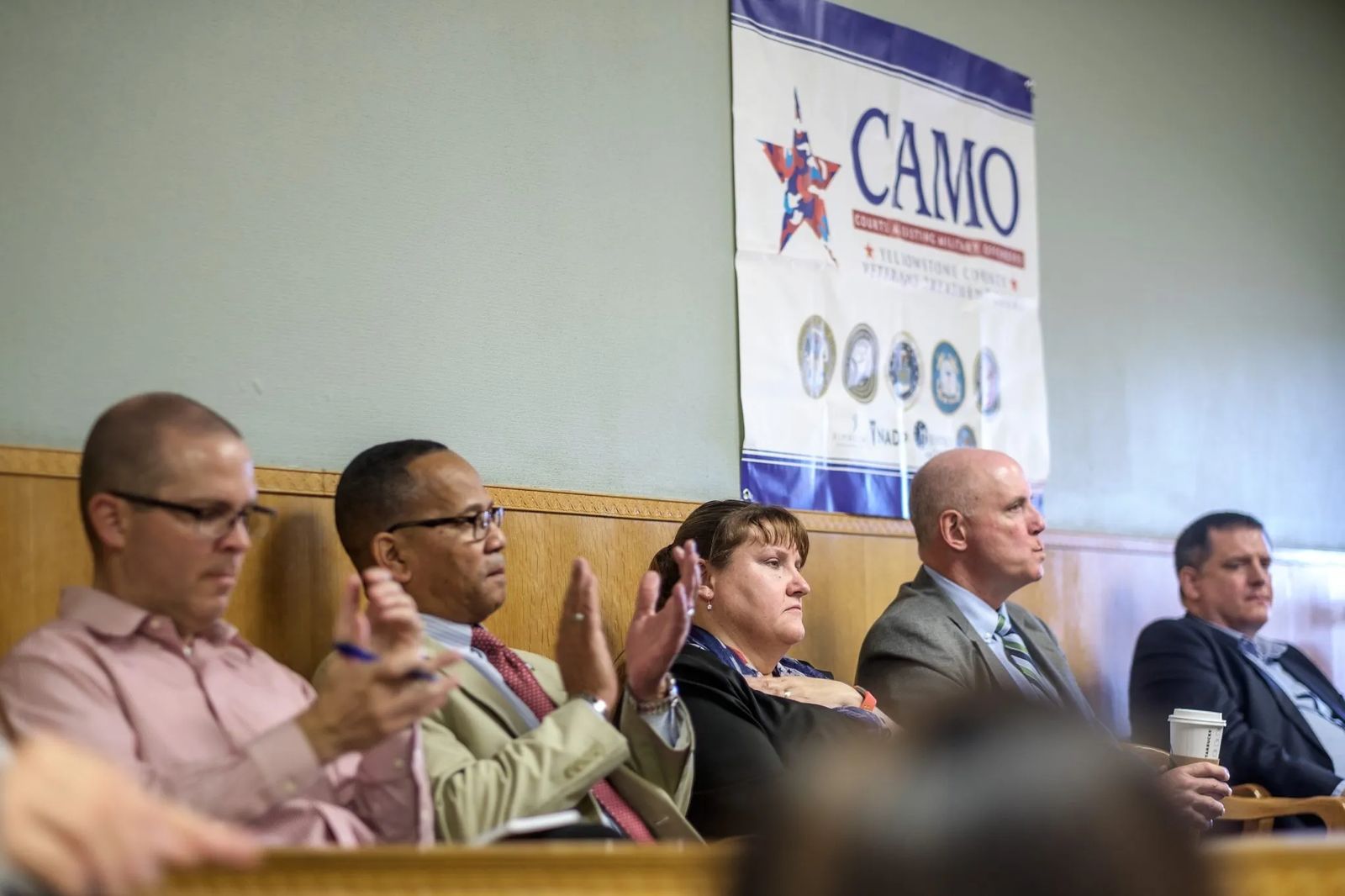
On this particular day, folks from Douglas County, Nebraska sat in the jury box with an eagle eye focus on the morning’s proceedings. They watch as one vet gives a presentation sharing his community service project at Family Service Incorporated.
“This man is the only person in his family who is not in prison for dealing meth,” Judge Knisely shares afterward. “He has a purple heart. He has a bronze star. He was a medic and saw many, many people blown up.” The former vet suffers a severe traumatic brain injury. Despite his past and the lifelong challenges, he will undoubtedly face, “He’s still trying to get along,” Judge Knisely says.
Bob Blanchard is part of that Nebraska team. After spending 27 years in probation, he’s spent the last year serving as the administrator for the Veteran’s Treatment Court in Douglas County. He’s found a new passion within criminal justice. Blanchard says, “We see the pictures of these clients when they were booked into jail. We listen to their stories and we see the sadness in some of them. Over time, we see the smiles emerge. We see them start to become proud of themselves.” Blanchard pauses before saying, “You can’t beat it — the feeling you get seeing this happen.”
This fall, as the Douglas County Veteran’s Court got ready to celebrate its first anniversary, the team returned to Yellowstone County with a new list of questions. “We thought we could share our successes and failures and see how this team dealt with those issues over the years.” Blanchard says he won’t forget the leg up Judge Knisely gave his county. “Seeing her passion and seeing her team’s passion? How they pull for each person who is in this program?” Blanchard calls it pure inspiration.

A VETERAN’S DAY IN COURT
As veteran after veteran approached the bench during the morning’s court session, they faced the court for a wide range of offenses — from driving under the influence to vehicular theft to criminal possession of dangerous drugs to vehicular homicide. Some were fresh in the program. Others were in their final phases.
Applause broke out as one vet shared that he was on his 286th day of being clean and sober. The 34-year-old former Navy man spoke frankly about the intensity of the CAMO court. “I just need to move forward and stay motivated. I have a lot on the line. I have a lot to lose.” Without skipping a beat, Judge Knisely smiled at the man and said, “You have a lot to gain as well.”
By the time these clients graduate, Judge Knisely will have seen them dozens upon dozens of times in her courtroom. They will have undergone more than four hundred hours of treatment. For the first 90 days, they are monitored 24/7. They’re drug tested three to five times a week. For the entire program, they have mandated community service hours. If they have children, they’ll enroll in parenting classes. They will take anger management classes to help them deal with their emotions and budgeting classes to help them get on track financially. Judge Knisely says, “They are just made over.”
As they stand before the court, just a few feet behind them, former military men serve as their mentors, helping to guide and support them every step of the way.
Jim McCracken, a 72-year-old Vietnam War Era Veteran, sits in the courtroom today. He wears a shirt with the Justice for Vets logo emblazoned on his chest. He’s there to stand behind his mentee, Drew Palmer, who’s on Judge Knisely’s docket that day.
“The reason why I got involved is that I am an alcoholic. I have 32 years of sobriety,” Jim says. “I go to meetings with them and they know I have been where they are at. A lot of them are in here for drugs. Mine was alcohol but when you have an addiction, it’s an addiction.”
He watched Drew, a 30-year-old Army Veteran, move from being a meth addict and felon to a young man who is now a contributing member of society. While Drew put in a lot of hard work, Jim knows Judge Knisely’s compassion from the bench played a big part in the transformation.
“She saves so many lives,” McCracken shares. “She must have a strong sense of character because Drew was a mess but she gave him the opportunity to come into this court. Otherwise, he would have been in prison. His life would never have changed. He would still be on drugs.” He pauses and adds, “She is a godsend for these guys.” (For more, scroll down for our sidebar story A Tale of Two Soldiers)
THE NEXT CHAPTER OF JUSTICE
It’s not just a mission to make a dent in DUI offenses or to restore honor to veterans that drives this District Court Judge. It’s a passion to change the lives of those who come before her court. Before she was even a city court judge, Mary Jane Knisely volunteered her time to make a difference in the lives of troubled teens with the Tumbleweed Runaway Program.
“I would be the crisis counselor and go meet runaways during the night and then, I would wake up and serve as a prosecutor by day,” Judge Knisely says. She did this double duty for ten years.
She’ll never forget the 12-year-old girl she met in the middle of the night, fleeing the life of being trafficked for sex. “It does break my heart. My heart is very, very broken a lot of the time. I don’t know how you make people completely whole,” she says of some of the cases she’s endured over the years.
Today, she serves on the Youth Justice Council under the Montana Board of Crime Control and, just like the innovation she’s sought in her own courtroom, she’s working on initiatives to make sure that young offenders are placed on the best possible paths toward success. She says, “The research shows that if you treat youth offenders the same as you treat adult offenders, all you end up doing is creating adult offenders.”
Knowing what these youth offenders face, she says, “That might be my next project.” To test the waters, she is already trying to mimic some of what she’s doing in her treatment courts in youth court. For some, she requires status reports and sees those defendants every couple of months. She says, “If they are doing well, I can give them an incentive. If they are not, I get a chance to try to redirect them and support juvenile probation. It’s working pretty well. If I had a lot of time, I would be doing all youth court cases that way.”
Truth is, despite these specialized courts, Judge Knisely doesn’t get a break in her normal criminal calendar. She holds the same caseload as other judges in the district, even though treatment courts are far more time intensive. Even still, it’s her hope to expand her role with treatment courts, not diminish it. She would love to target young adults next. “I feel like we have a void in the population that needs a problem-solving court and that involves those 21 to 25 years old.” These defendants are beyond youth court but are at a vulnerable crossroads. It’s one which could mean living a life on the right path or one that could have them venturing instead down a criminal road.
This time, Judge Knisely is leaning on the folks from Douglas County, Nebraska, a jurisdiction that already has a young adult court up and running. Judge Knisely laughs a bit when she talks about the next big project. “I am a big picture thinker. I sleep very little, very little, which is good or bad because I am excited about so much. I want to dip my toe into something new all the time.”
As she dreams about the next big project, today, the cases on her desk divert her attention. She thinks about the young man she encountered that morning — the multi-state offender anxiously awaiting word to hear if he would make it into the CAMO court for treatment.
“I pray that I do the right thing,” she says as she reflects on this young man’s fate. “I definitely want him to lick the addictions, to see what it could be like to be clean and sober and to start over.”
While her focus is on this inmate today, her philosophy with him is one she shares with each and every defendant that enters her courtroom.
“I think it would be a waste not to try!” she says. “People deserve a second, a third, even a fourth chance.” As she reflects on those enrolled in her treatment courts, she says passionately, “How do you know when it’s the day? How do you know when this is the time that the treatment sticks? I never want to give up on anybody. I want to keep rooting for them.”
 Drew Palmer (right) and Jordan Mordhorst (center) visit with Judge Mary Jane Knisely in her chambers. [/caption]
Drew Palmer (right) and Jordan Mordhorst (center) visit with Judge Mary Jane Knisely in her chambers. [/caption]
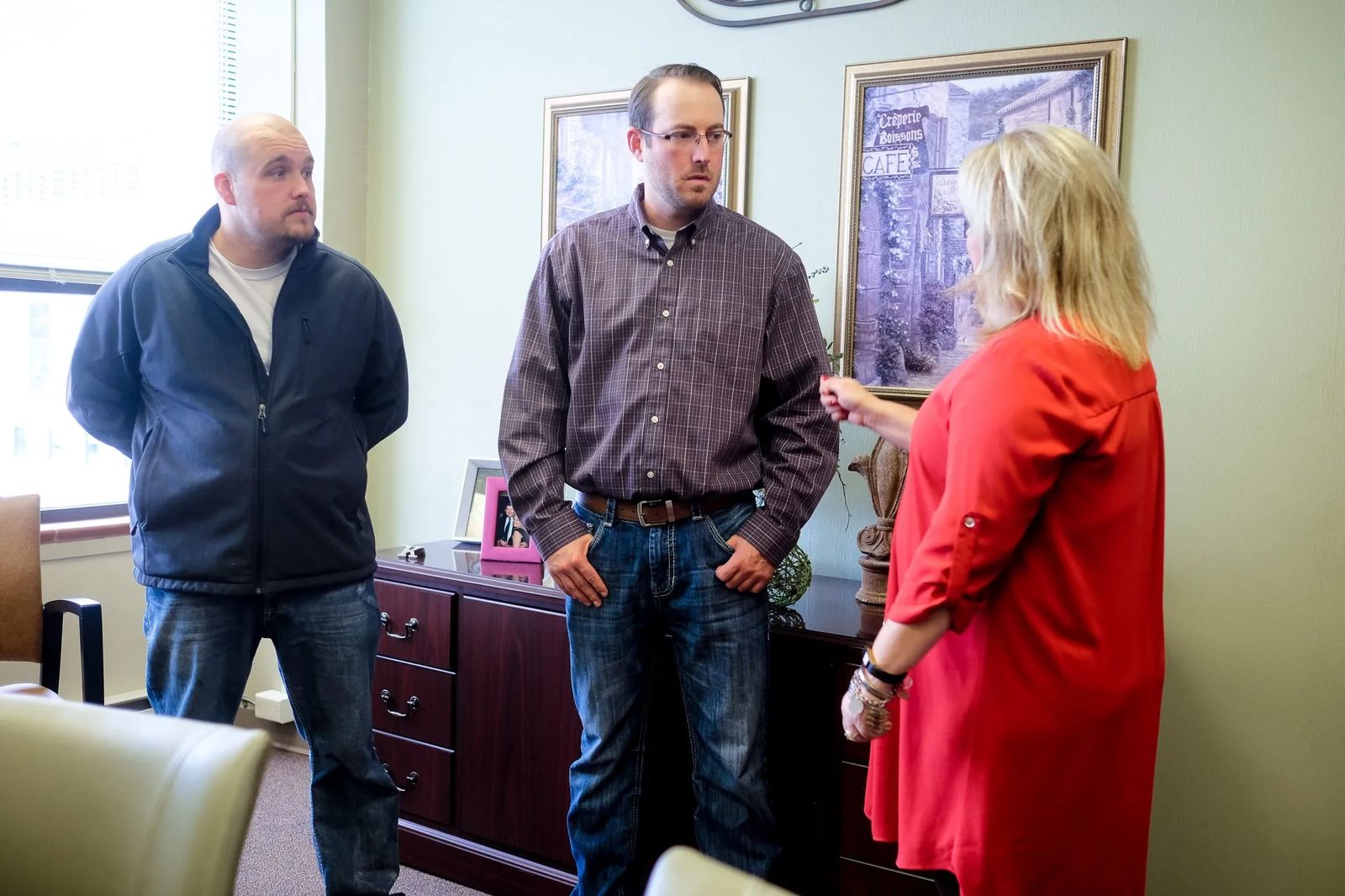
A Tale of Two Soldiers
Mended Lives & Second Chances thanks to CAMO
Jordan Mordhorst is a 34-year-old graduate of the CAMO court. In 2005, this twice-deployed U.S. Marine returned home from his second tour in Iraq a broken man.
“I found comfort in drinking to handle the anxiety and depression,” he says somberly now.
As a member of the Marine Medium Helicopter Squadron 364 known as the “Purple Foxes,” Mordhorst explains his role in Operation Iraqi Freedom. “In 2003 and 2004, we did casualty evacuations. Our helicopter unit’s primary mission was to get the wounded to medical facilities.” The team would fly into hot zones, looking for the injured. “We lost a helicopter during my deployment with four crew members.” The anniversary of losing his military brothers is a major cause of his Post Traumatic Stress.
“The PTSD is always there,” he says. After he got out of the military, his drinking spiraled out of control. Over the course of eight years, he had four DUI charges under his belt. As he sat in jail facing his fourth, now felony, charge, he knew something had to change. “My life was never going to get better. I wasn’t happy with my life in general because of my drinking but I was drinking because I didn’t like my life. It was just this tornado.”
That’s when Jeri Anderson of the Veteran’s Administration asked him if he wanted to give the CAMO court a try. He decided he needed to do something. “I was either going to die, wind up in prison, or lose my family, Jordan says. “I made up my mind that was it. I was done drinking.”
Jordan graduated from the program two years ago and has been sober for three and a half years. After witnessing the trauma play out in the lives of his fellow soldiers, he feels fortunate he got a second chance. “The suicides of the friends that I served with – there were more than 15. I’ve lost touch with some of them. They turned to drugs and alcohol. They could be dead. They could be living under a bridge someplace.”
Instead of following in their footsteps, Jordan Mordhorst is a happily married father of two daughters.
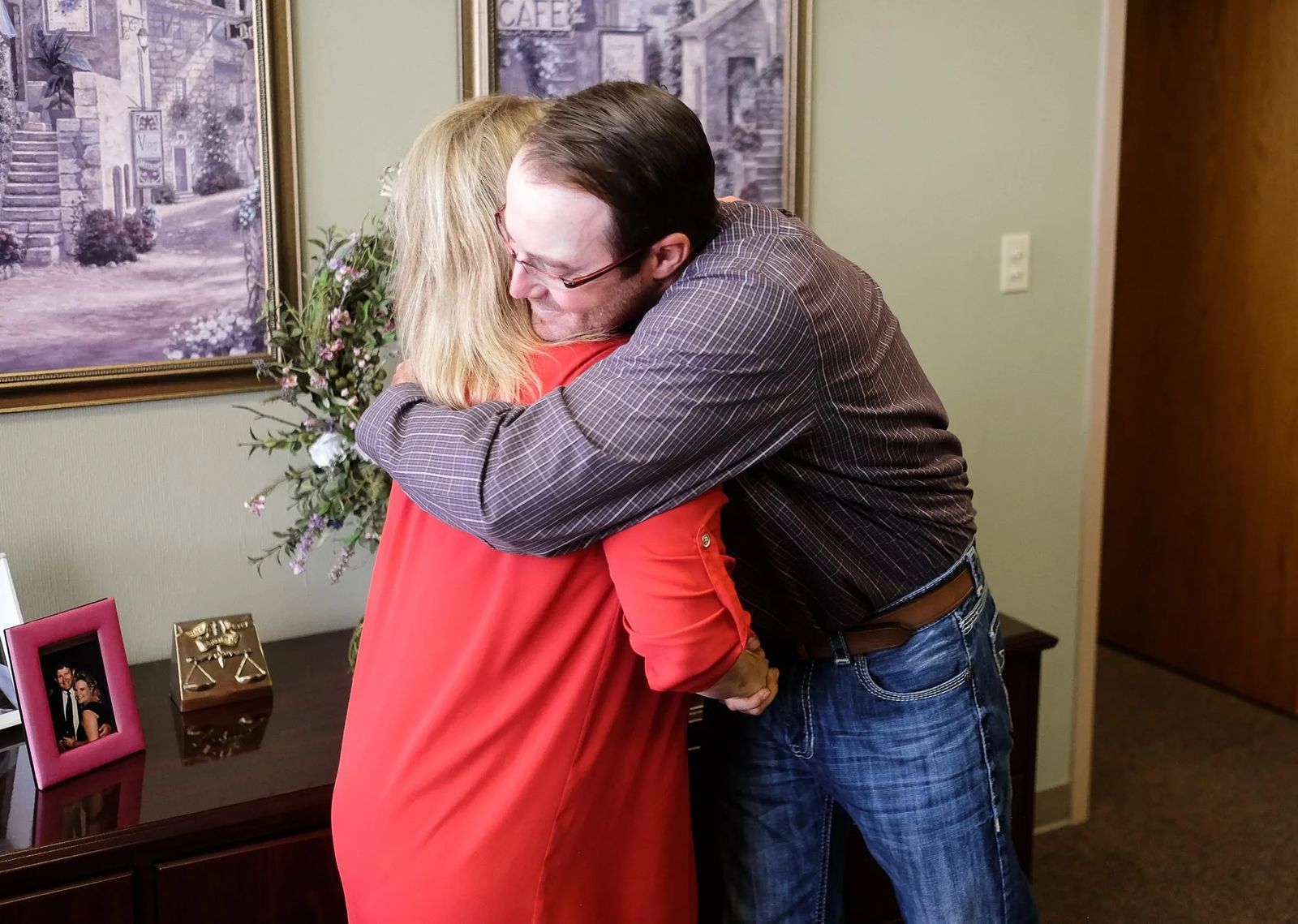
“This court has done so much for me. My wife and I are the strongest that we have ever been,” he says with emotion evident. “My girls are my life.” After going through the program, he went back to graduate school. A year and a half ago, he walked across the stage at Montana State University in Bozeman with a master’s degree in engineering management.
He still stops up to say hello to Judge Knisely whenever he’s in the neighborhood. “I tell her thank you all the time. It’s probably worn its merit out,” he says with a slight laugh. “She was the hammer, the gavel, but at the same time, she had this compassion, understanding, and willingness to help. I owe so much to her.”
OUT OF THE SHADOWS
Thirty-year-old Drew Palmer felt like he didn’t have one person to believe in him before he walked through the doors of Judge Knisely’s courtroom. He suffered heavy abuse as a young man. His parents were habitual drug users. His dad died at 52 from a massive heart attack due to continued meth use. That’s why meth was also Drew’s drug of choice. Sobriety was an elusive creature that never seemed to settle into his life. His dad introduced him to hardcore drugs at 14 and eventually, the need to get high escalated to criminal activity.
“At 18, I joined the Army,” Drew says today. “It was actually an attempt to try to save myself from going to prison.”
Sadly, it didn’t work. After blowing drug test after drug test while on weekend military leave, Drew was discharged from the military for bad conduct. He came back to Billings and his career as a criminal picked up right where it left off. He was homeless at the time, squatting on a piece of land in Laurel, living in a tent.
His last crime got the attention of Judge Knisely’s CAMO court. He had stolen a vehicle off the lot at Laurel Ford and drove it for five months until an officer spotted the vehicle and busted Drew for not only felony theft but felony drug charges and eluding an officer.
“I couldn’t take my own life but I was on this path that would take my life,” Drew says as he reflects on that dark time. He still carries around a picture of his last arrest. In it, you see the meth-addicted shell of the man Drew is today.
“A course of vigorous reconstruction had to take place and this program is what did it.” Of Judge Knisely, Drew says with tears in his eyes, “She saved my life, absolutely saved my life.”
He’s 21 months into the CAMO court program. “I have my own house. I have a girlfriend. We are having twins!” He has a full-time job and is on the management track at Albertsons. “I had so much to deal with. This program has given me that chance to bundle it all and take care of it piece by piece,” Drew says. “I don’t have to run anymore.” When he gets that urge, Drew says,” I take a deep breath and I think about how far I have come up this ladder.”
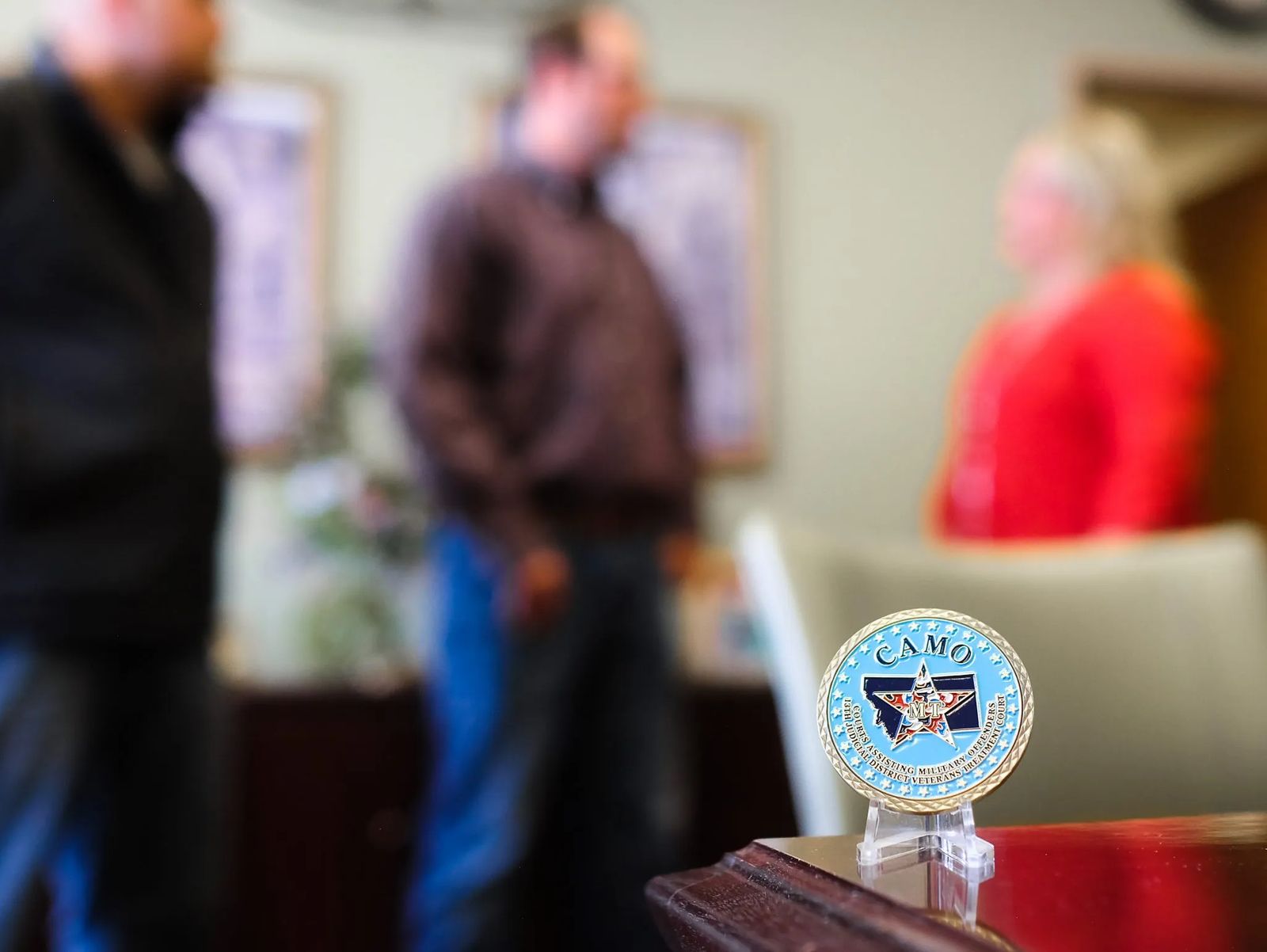
Yellowstone County District Court Treatment Court Programs
Two programs making a difference
STEER, also known as Sobriety Treatment Excellence Education and Rehabilitation, is a felony impaired driving court funded by Montana Department of Transportation and National Highway Traffic Safety monies. Expansion grant funding helps the program accept more people into the program and as a result, try to target the state’s traditionally high number of impaired driving fatalities.
CAMO, also known as Courts Assisting Military Offenders, is funded through state legislative dollars. An expansion grant helps the court to accept a greater number of veterans who currently serve or have served in the U.S. Armed Services and are charged with a felony or misdemeanor offense.
For every dollar spent on treatment courts, you save $4 in criminal justice. Cost savings arise from less time being incarcerated, fewer dollars spent caring for a defendant’s children in the foster care system and the reduced cost tied to low rate of criminal re-offense.















